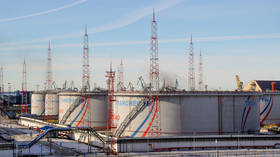Russia's neighbor hikes oil transit levy

Kazakhstan has raised the tariff on the transit of Russian oil by some 20% from January 1, according to an announcement on the official website of the country’s pipeline operator KazTransOil.
The measure covers crude transported along the 186km Kazakhstan section of the Tuymazy-Omsk-Novosibirsk-2 (TON-2) pipeline. The levy was raised to $11.3 per ton per 1,000km, up from $9.3, which had been in force since 2018. Given the length of the pipeline section running through Kazakhstan, the cost of pumping oil for transit through its territory will cost Russia $2.1 per ton.
TON-2 has an established throughput capacity of 10 million tons of oil per year, but its design capacity reaches 18 million tons. The pipeline carries Russian oil to the Pavlodar petrochemical plant, the largest refinery in the northeast of Kazakhstan, as well as further to China and Uzbekistan.
According to recent media reports, Russia plans to boost oil flows via TON-2 more than threefold in 2024 on requests from buyers. In particular, Uzbek Energy Ministry announced in November that it wanted to raise its imports of Russian oil and petroleum products to 1 million tons in 2024. It noted at the time that oil imports via the pipeline traditionally come cheaper than rail deliveries.
Last month, another Russian neighbor, Belarus, also announced its intention to hike the transit levy on Russian oil, which is transported through its territory to the EU via the southern section of the Druzhba pipeline. The measure, which had been coordinated with Moscow, will see the transit tariff raised by 10.2% and is expected to come into force on February 1, 2024.
For more stories on economy & finance visit RT's business section












